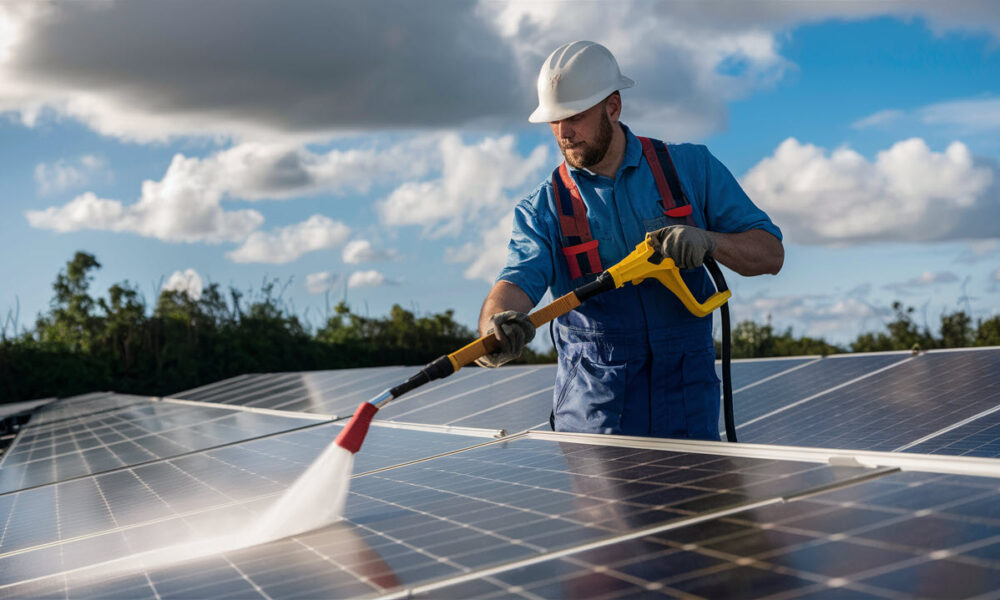Solar Panel Cleaning: Enhancing Performance and Longevity with Proper Care

Solar panels are a significant investment for homeowners and businesses seeking sustainable energy solutions. Their ability to harness sunlight and convert it into electricity depends heavily on maintaining their efficiency, which can be impacted by dirt, debris, and other environmental factors. Regular cleaning of solar panels ensures optimal performance, prolongs their lifespan, and maximizes energy output.
In this article, we explore the importance of solar panel cleaning, best practices, and how proper care can lead to long-term benefits.
Why Solar Panel Cleaning Matters
Solar panels are designed to absorb sunlight and generate electricity through photovoltaic cells. However, as they are exposed to outdoor conditions, they accumulate dust, pollen, bird droppings, and other debris that obstruct sunlight. This accumulation can reduce energy production by up to 25% or more in some cases. Regular cleaning is essential to maintain optimal efficiency and achieve the return on investment solar panel owners expect.
Key reasons why solar panel cleaning is vital include:
- Maximizing Energy Efficiency
- A clean solar panel absorbs more sunlight, leading to higher energy output.
- Even small obstructions can create hotspots, which compromise the panel’s performance.
- Prolonging Lifespan
- Dirt and debris can degrade the panel’s surface over time, leading to permanent damage.
- Regular cleaning prevents buildup that could cause corrosion or wear.
- Ensuring Warranty Compliance
- Many solar panel manufacturers require regular maintenance, including cleaning, to keep warranties valid.
Best Practices for Solar Panel Cleaning
Proper cleaning techniques are crucial to avoid damaging the panels while ensuring effective results. Follow these best practices for safe and efficient solar panel maintenance:
- Use Soft Cleaning Tools
- Opt for a soft brush or microfiber cloth to avoid scratching the panel’s surface.
- Avoid abrasive materials or harsh scrubbing tools.
- Choose the Right Cleaning Solution
- Use mild, biodegradable soap mixed with water to remove dirt and grime.
- Avoid harsh chemicals that can damage the protective coating on the panels.
- Clean During Cooler Hours
- Early mornings or evenings are ideal for cleaning, as the panels are cooler and less likely to crack under sudden temperature changes.
- Avoid High-Pressure Washing
- High-pressure washers can damage the seals and joints of the panels.
- Use a low-pressure garden hose for rinsing instead.
- Check Manufacturer’s Guidelines
- Follow the cleaning instructions provided by the manufacturer to ensure proper maintenance without voiding the warranty.
Techniques for Cleaning Hard-to-Reach Panels
Solar panels installed on rooftops or other elevated areas can be challenging to clean. Here are some techniques to ensure thorough cleaning without risking safety:
- Extension Poles
- Use extension poles with soft brushes or squeegees to reach elevated panels from the ground.
- Hire Professionals
- For hard-to-reach installations, professional cleaning services have the tools and expertise to clean safely and effectively.
- Avoid Climbing Without Proper Safety Gear
- If cleaning the panels yourself, use a stable ladder and safety harnesses to prevent accidents.
How Weather Impacts Solar Panel Maintenance
Weather conditions play a significant role in the frequency and method of cleaning required for solar panels. Understanding these factors helps determine the best maintenance schedule:
- Rain
- While rain can wash away some surface dirt, it often leaves behind mineral deposits and streaks.
- Regular cleaning is still necessary to remove persistent debris and grime.
- Snow
- Snow can obstruct sunlight, reducing energy production.
- Use a soft snow rake to remove snow without damaging the panels.
- Dust Storms and Pollen Seasons
- Areas prone to dust storms or heavy pollen require more frequent cleaning to maintain efficiency.
- Bird Droppings
- Bird droppings are acidic and can cause permanent damage if not removed promptly.
The Role of Professional Solar Panel Cleaning Services
While DIY cleaning is an option, professional solar panel cleaning services provide distinct advantages:
- Thorough Cleaning
- Professionals use specialized equipment and techniques to ensure all debris, dirt, and buildup are removed effectively.
- Safety
- Trained technicians can clean panels installed in hard-to-reach areas without risking injury.
- Efficiency
- Professional cleaning is faster and more effective, saving time and ensuring optimal results.
Preventative Measures for Long-Term Solar Panel Care
Preventative care reduces the frequency of cleaning and helps maintain panel efficiency. Consider these strategies:
- Install Protective Barriers
- Use bird deterrents or guards to prevent nests and droppings.
- Regular Inspections
- Inspect panels periodically for signs of damage, debris, or buildup.
- Address minor issues promptly to avoid costly repairs.
- Positioning Panels Strategically
- If possible, position panels to minimize exposure to dust and debris without compromising sunlight absorption.
How Max’s Window Cleaning | Pressure Washing Can Help
Max’s Window Cleaning | Pressure Washing offers expert solar panel cleaning services in Los Angeles designed to enhance performance and longevity. Their team uses industry-leading techniques and eco-friendly solutions to safely clean solar panels, ensuring maximum energy output and extended lifespan. With a commitment to quality and safety, they help homeowners and businesses maintain their solar investments with ease.
Conclusion
Regular cleaning and maintenance are essential to optimize the performance and lifespan of solar panels. By adopting proper cleaning practices and scheduling professional services when needed, solar panel owners can ensure their systems operate at peak efficiency year-round. Max’s Window Cleaning | Pressure Washing is a trusted partner in maintaining clean and efficient solar panels, making sustainable energy a reliable and long-term solution for your property.
Read more from techbullion




![find-out-more-about-the-3-best-new-meme-coins-to-invest-in-now-[a-$5.1m-presale-ready-to-shake-up-crypto]](https://currentmoneytips.com/wp-content/uploads/2025/01/3731-find-out-more-about-the-3-best-new-meme-coins-to-invest-in-now-a-5-1m-presale-ready-to-shake-up-crypto-390x220.jpg)
